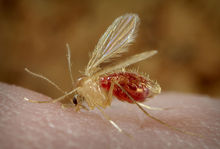Leishmaniasis, a parasitic disease usually seen only in humans and animals that have recently traveled in tropical regions, has been diagnosed in a mare in Florida. Although she had not traveled outside the country, the mare developed multiple ulcerated nodules on her ear, neck, and shoulders.

Sandfly that carries Leishmania
Leishmaniasis, a parasitic disease usually seen only in humans and animals that have recently traveled in tropical regions, has been diagnosed in a mare in Florida.
© 2012 by Frank Collins
When the lesions were biopsied, DNA testing showed Leishmania, a protozoan. The particular species had not been reported previously in the U.S., though it is known to cause disease in humans in parts of Asia.
The disease is spread by biting sand flies infected with the protozoa. Sand flies are not new to Florida, but global climate changes may be increasing their range and allowing the entry of previously unknown species. Sand flies capable of spreading the disease have been found in southern Texas and leishmaniasis has been reported in 21 states and Canada
A few cases of leishmaniasis have been previously reported in foxhounds and humans in North America, but the Florida mare is believed to be one of the first horses in the U.S. to become infected with the parasite. The disease can be treated with antifungal medications such as amphotericin B and fluconazole, or specific antiprotozoal drugs.
